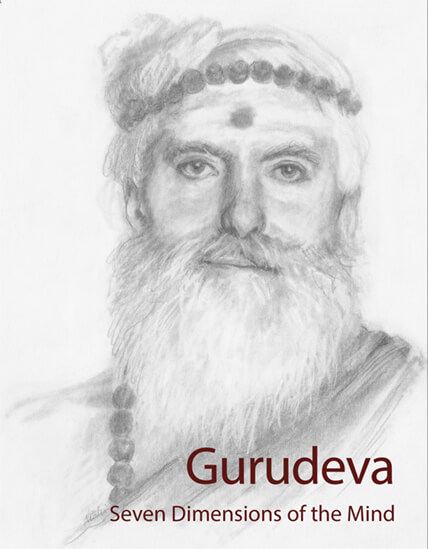Seven Dimensions of the Mind
Aum Namah Sivaya
For those that missed it, one of our latest publications is now available on our Himalayan Academy website. Gurudeva’s Seven Dimensions of the Mind is a powerful guide to the inner workings of our own inner and outer being. It’s currently available here in PDF, Epub and Kindle editions.
“The dimensions are a positive and helpful way of looking at life and understanding the experiences we have on the inward path. By identifying experience as being within one dimension or another, we are able to know at all times just where we are in consciousness, and that knowledge is the control over awareness that we need to continue the upward climb.
“At all times we are flowing through all of the dimensions. They all exist in total completion right now within us. However, we are only conscious periodically in one or another of them as awareness magnifies itself and registers the dimension by focusing upon it, shall we say.”
Tirukural – Chapter 25
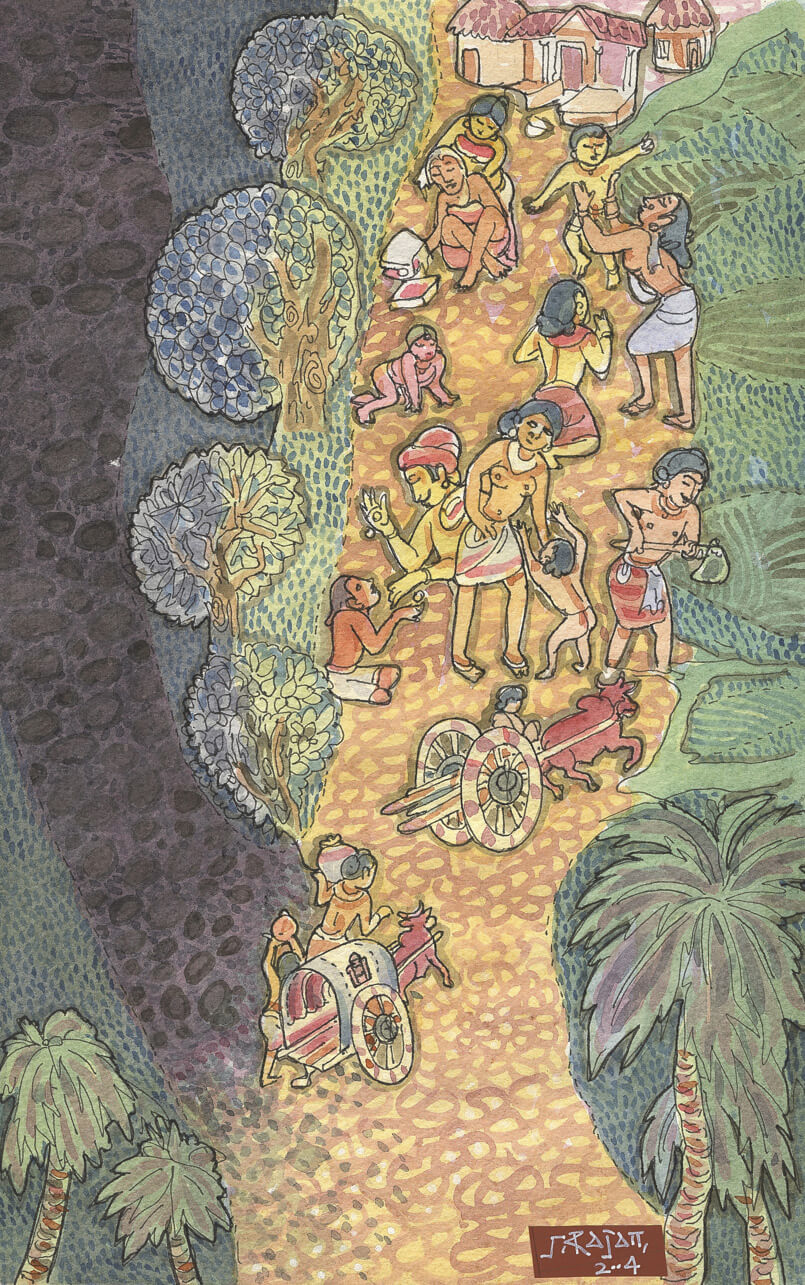
Section III: The Way of The Renunciate
Chapter 25: Possession of Compassion

Verse 242
A road through the fields and groves splits. To the left is the path of darkness. To the right is the golden path of compassion where we see everyone helping one another and showing kindness.
You can access the entire text, in Tamil and English here:
Weaver’s Wisdom
Verse 241
Among the wealthy, compassionate men claim the richest wealth,
for material wealth is possessed even by contemptible men.
Verse 242
Find and follow the good path, ruled by compassion.
Of the many ways, that one leads to liberation.
Verse 243
Those whose hearts are drawn toward mercy
will never be drawn into the dark and woeful world.
Verse 244
Kindly ones who lovingly protect all life
need never dread hurt from the actions of their own life.
Verse 245
This wide and wind-swept fertile Earth is witness to the truth
that misery is not for kind-hearted men.
Verse 246
They say those who act cruelly by forsaking kindness
must have forgotten what it means to forsake virtue.
Verse 247
As this world is not for the penniless,
so is that world not for the pitiless!
Verse 248
Those without wealth may one day prosper,
but those without kindness are utterly and incurably poor.
Verse 249
Practicing charity without compassion is as inconceivable
as realizing God without clarity of mind.
Verse 250
Before proceeding against men weaker than yourself,
ponder when you stood before those more powerful.
Tirukural – Chapter 24

Chapter 24: Glory

Verse 234
By their good deeds, feeding and clothing the indigent, this couple has earned the abundant blessings of the celestials. So valued is this simple and selfless act, that the devas ignore the sages and yogis below.
You can access the entire text, in Tamil and English here:
Weaver’s Wisdom
Verse 231
Give to the poor and become praiseworthy.
Life offers no greater reward than this.
Verse 232
Those who expound will always praise
people who bestow alms on the imploring poor.
Verse 233
Nothing on Earth is imperishable,
except exalted glory, which endures forever.
Verse 234
So great is glory gained by men in this world
that celestials cease praising ascended sages.
Verse 235
Loss that is gain and death that is life of
immortal glory are attained only by the wise.
Verse 236
If you must be born, be born for glory.
Those born without it would be better off without birth.
Verse 237
Why do those whose life is devoid of renown blame enemies
who hate them, when they have themselves to blame?
Verse 238
Barren are they and deemed a disgrace by all men on Earth
who fail to beget the offspring called fame.
Verse 239
Even flawlessly fruitful lands will lessen their yields
when forced to support the body of one who lacks illustriousness.
Verse 240
Those who live without reproach truly live.
Those who live without renown don’t live at all.
Tirukural – Chapter 23
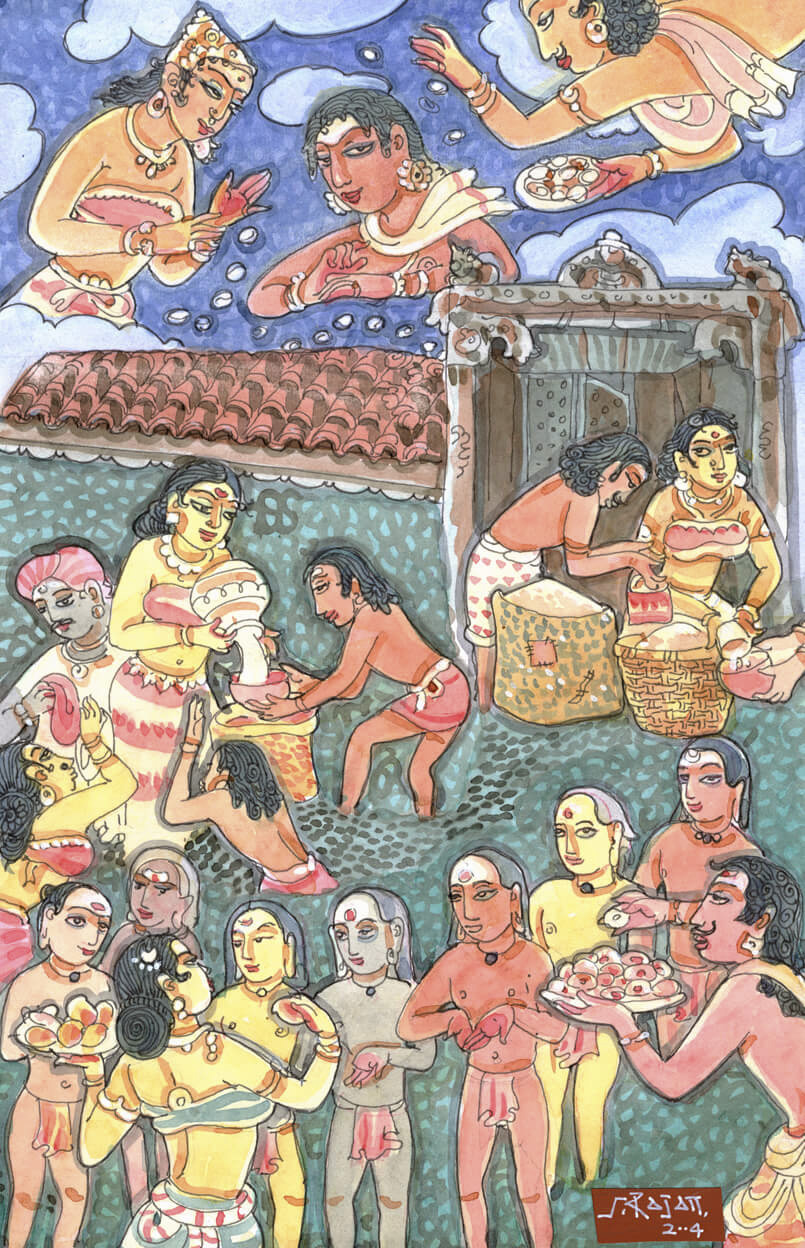
Chapter 23: Charity

Verse 226
A rich family is seen personally feeding the poor in their home, a temple and the marketplace. They have learned that to relieve the hunger of the less fortunate is the right use of their wealth. They receive the blessings of the inner plane deities.
You can access the entire text, in Tamil and English here:
Weaver’s Wisdom
Verse 221
Giving to the poor is true charity.
All other giving expects some return.
Verse 222
Though some may declare it a good path, garnering gifts is bad.
Even if they say it denies one Heaven, giving gifts is good.
Verse 223
Men of good birth graciously give,
never uttering the wretched excuse, “I have nothing.”
Verse 224
How unpleasant a beggar’s pleading can become,
until one sees his face so sweetly pleased.
Verse 225
Great, indeed, is the power to endure hunger.
Greater still is the power to relieve others’ hunger.
Verse 226
Relieving the ravaging hunger of the poor
is a right use for wealth men have obtained.
Verse 227
The fiery scourge called hunger never touches
the man who shares his daily meal with others.
Verse 228
Is it because they are unaware of the joys of giving
that hard-hearted men waste their wealth by hoarding it?
Verse 229
More bitter than even a beggar’s bread is the meal
of the miser who hoards wealth and eats alone.
Verse 230
There is nothing more bitter than death;
yet even death seems sweet when giving is impossible.
Tirukural – Chapter 22
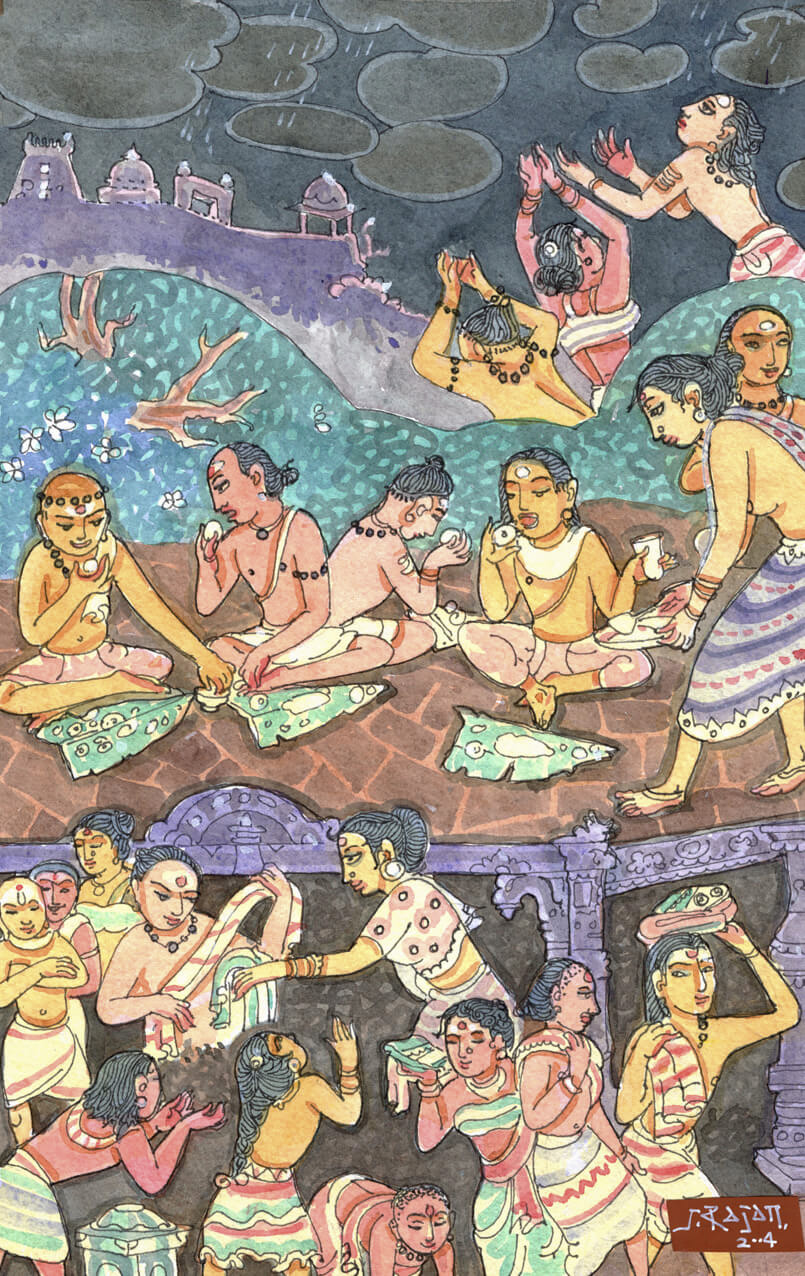
Chapter 22: Understanding One’s Duty to Give

Verse 211
A man and woman are distributing food and clothing to impoverished people in the marketplace. Elsewhere they feed the hungry. Above, rain clouds gather at the distance and citizens offer their gratitude for the life-giving waters.
You can access the entire text, in Tamil and English here:
Weaver’s Wisdom
Verse 211
The benevolent expect no return for their dutiful giving.
How can the world ever repay the rain cloud?
Verse 212
It is to meet the needs of the deserving
that the worthy work so hard to acquire wealth.
Verse 213
Of all duties, none is better than benevolence,
whether in this world or that of the Gods.
Verse 214
He who understands the duty of giving truly lives.
All others shall be counted among the dead.
Verse 215
The wealth of a community-loving wise man
may be likened to a well-filled village water tank.
Verse 216
Riches retained by the big-hearted resemble fruits
ripening on a tree in the heart of a village.
Verse 217
In the hands of a generous man,
wealth is like a medicinal tree whose healing gifts help all.
Verse 218
Those who know duty deeply never neglect giving,
even in their own unprosperous season.
Verse 219
The benevolent man considers himself poor only
when he is unable to render his accustomed duty to humanity.
Verse 220
Were it said that loss of wealth is the price of generosity,
such loss would be worth selling one’s self to acquire.
Tirukural – Chapter 21
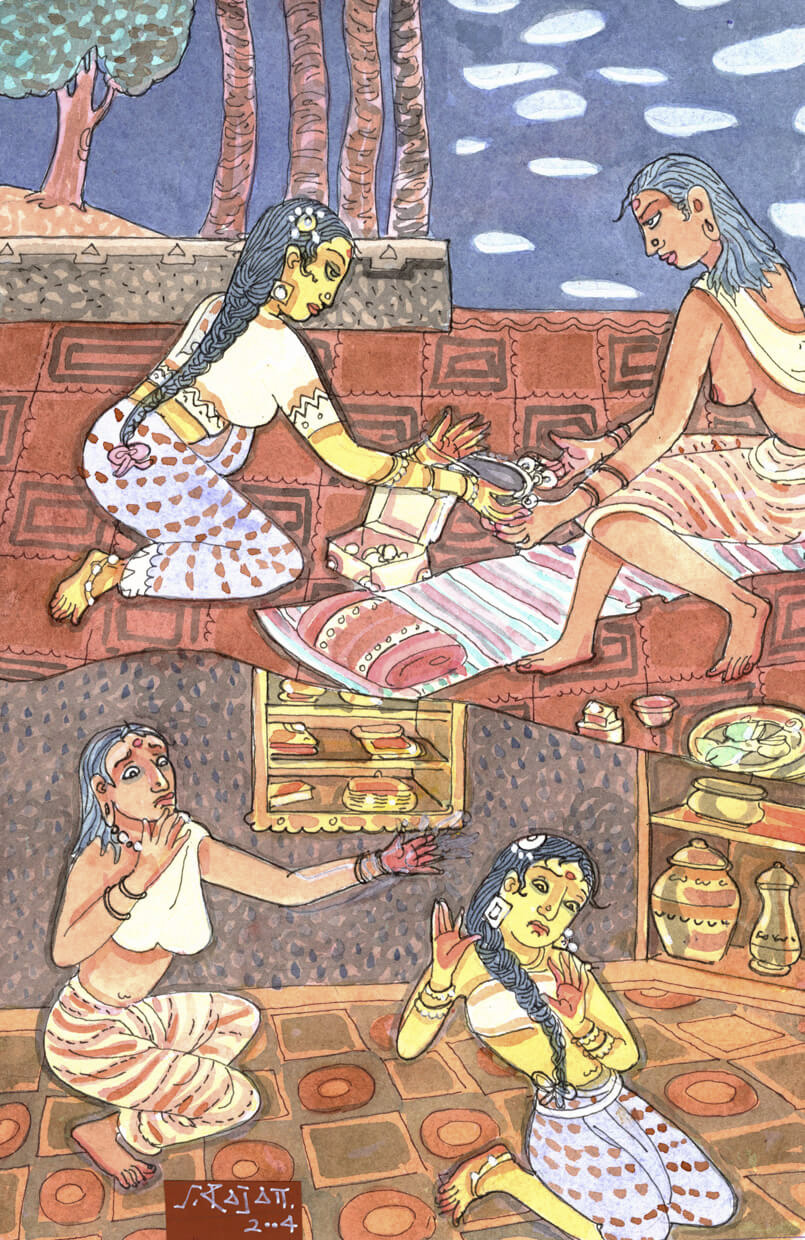
Chapter 21: Dread of Sinful Deeds

Verse 206
A woman offers a gift to an older relative. Below, the older woman remembers that she herself hit the younger girl earlier and regrets the act, and her hurtful attack brings great suffering.
You can access the entire text, in Tamil and English here:
Weaver’s Wisdom
Verse 201
Wicked men do not fear, but worthy men dread,
the arrogance of sinful deeds.
Verse 202
From evil springs forth more evil.
Hence evil is to be feared even more than fire.
Verse 203
To commit no wrong, even against one’s enemies,
is said to be supreme wisdom.
Verse 204
Only the forgetful plot another’s ruin; others remember
that virtue itself devises every plotter’s downfall.
Verse 205
Do not commit wrongful deeds, claiming to be poor.
Such deeds only cause one to be poorer still.
Verse 206
Let one who hopes for freedom from afflictions’ pain
avoid inflicting harm on others.
Verse 207
One can escape from hate-filled enemies,
but his own hateful acts will pursue and destroy him.
Verse 208
As a man’s shadow follows his footsteps wherever he goes,
even so will destruction pursue those who commit sinful deeds.
Verse 209
If a man feels any fond affection for himself,
let him not indulge in immoral deeds, however trifling.
Verse 210
If men neither deviate from right nor act wrongly,
they will be defended against destruction.
Tirukural – Chapter 20
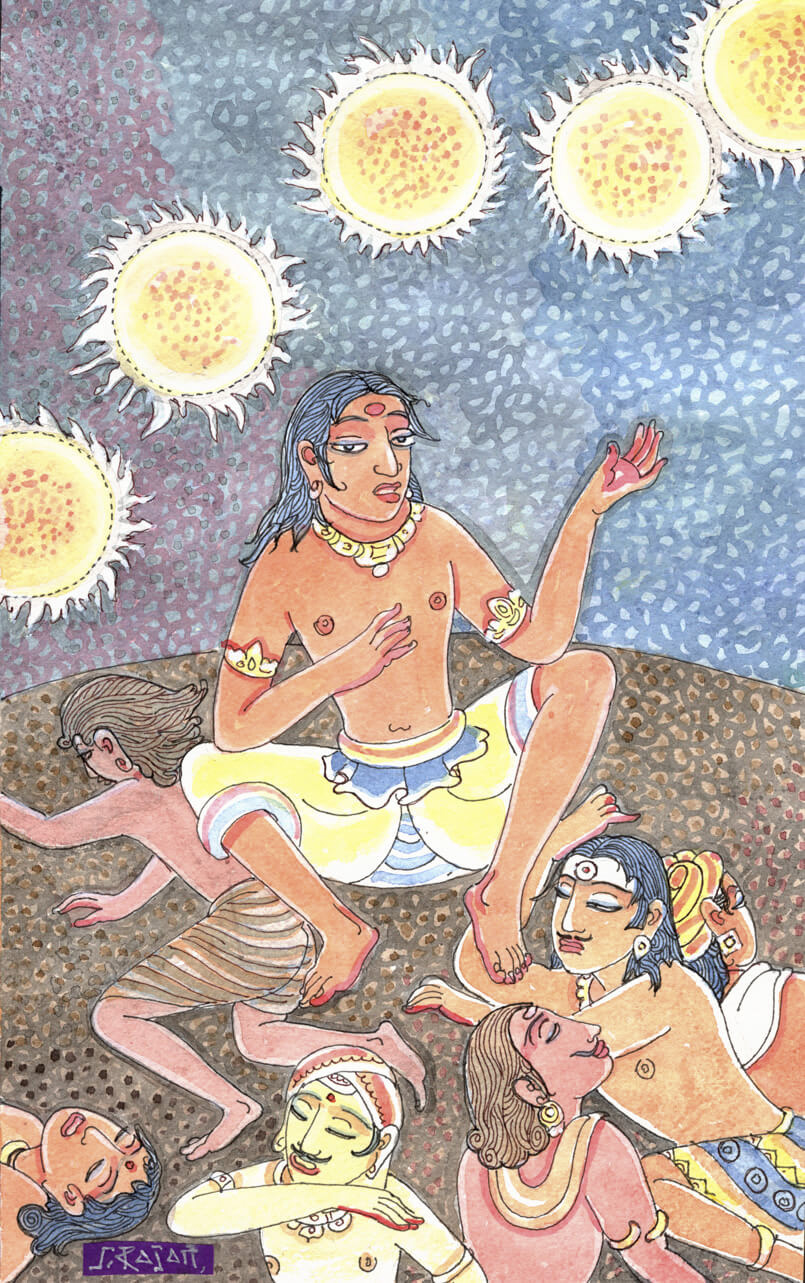
Chapter 20: Avoidance of Pointless Speech

Verse 193
A man tires his friends with an overly long discourse. The sun crosses the sky, telling us he has talked endlessly from morning to night. His friends are showing signs of boredom. One slips away, another yawns while yet another goes to sleep.
You can access the entire text, in Tamil and English here:
Weaver’s Wisdom
Verse 191
Everyone is disgusted by a man
who offends one and all with meaningless chatter.
Verse 192
Uttering useless words to crowds is worse
than committing unkindnesses toward companions.
Verse 193
A long and pointless discourse itself declares
to all the speaker’s lack of worth.
Verse 194
Worthless words are doubly unprofitable: the listeners’
enjoyment is lost, and the speaker’s own virtues vanish.
Verse 195
Prestige and popularity flee the best of men
the moment they speak inane and useless words.
Verse 196
Do not call him a man who enjoys displaying
his own empty words. Rather, call him the chaff of men.
Verse 197
Let the wise, if they deem it necessary, speak even unpleasant
words, but it is good if they always refrain from pointless speech.
Verse 198
Even in search of extraordinary gains, the wise
will never speak trivial or ungainful words.
Verse 199
The wise, faultless and free from ignorance,
never utter pointless words, even forgetfully.
Verse 200
In your speaking, say only that which is purposeful.
Never utter words that lack purpose.
Tirukural – Chapter 19
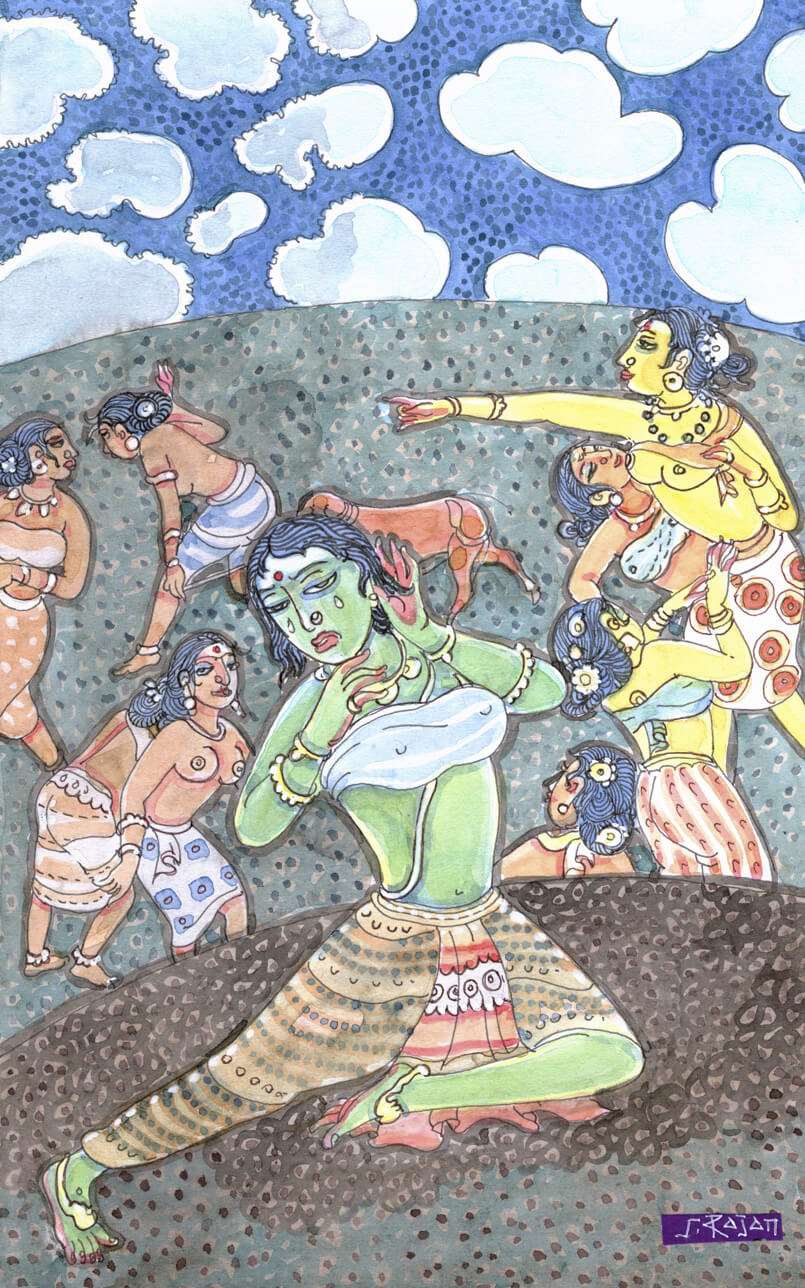
Chapter 19: Avoidance of Backbiting

Verse 189
Mother Earth is weeping as she watches a woman malign others who are leaving her company and cannot hear her criticisms.
You can access the entire text, in Tamil and English here:
Weaver’s Wisdom
Verse 181
Silent about virtue and swift to act wrongly,
one who does not slander others may still be called good.
Verse 182
More vile than violating virtue and committing crime
is slandering a man, then smiling to his face.
Verse 183
Virtue declares that dying, not living, will bring
better rewards to deceiving backbiters.
Verse 184
Though you speak unkind words to a man’s face,
do not talk behind his back heedless of consequent harm.
Verse 185
Though his every word is full of kindly virtue,
a man’s mean backbiting will betray an empty heart.
Verse 186
If a man spreads tales of others’ faults,
his own worst faults will be exposed and spread.
Verse 187
Not knowing the companionable art of cheerful conversation,
men estrange even friends by divisive discourse.
Verse 188
If men are disposed to spread the faults of friends,
what deadly harm might they do to strangers?
Verse 189
Only because she weighs duty well does Earth bear the weight
of those who wait for a man’s departure to defame him.
Verse 190
If men perceived their own faults as they do the faults of others,
could misfortune ever come to them?
Tirukural – Chapter 18
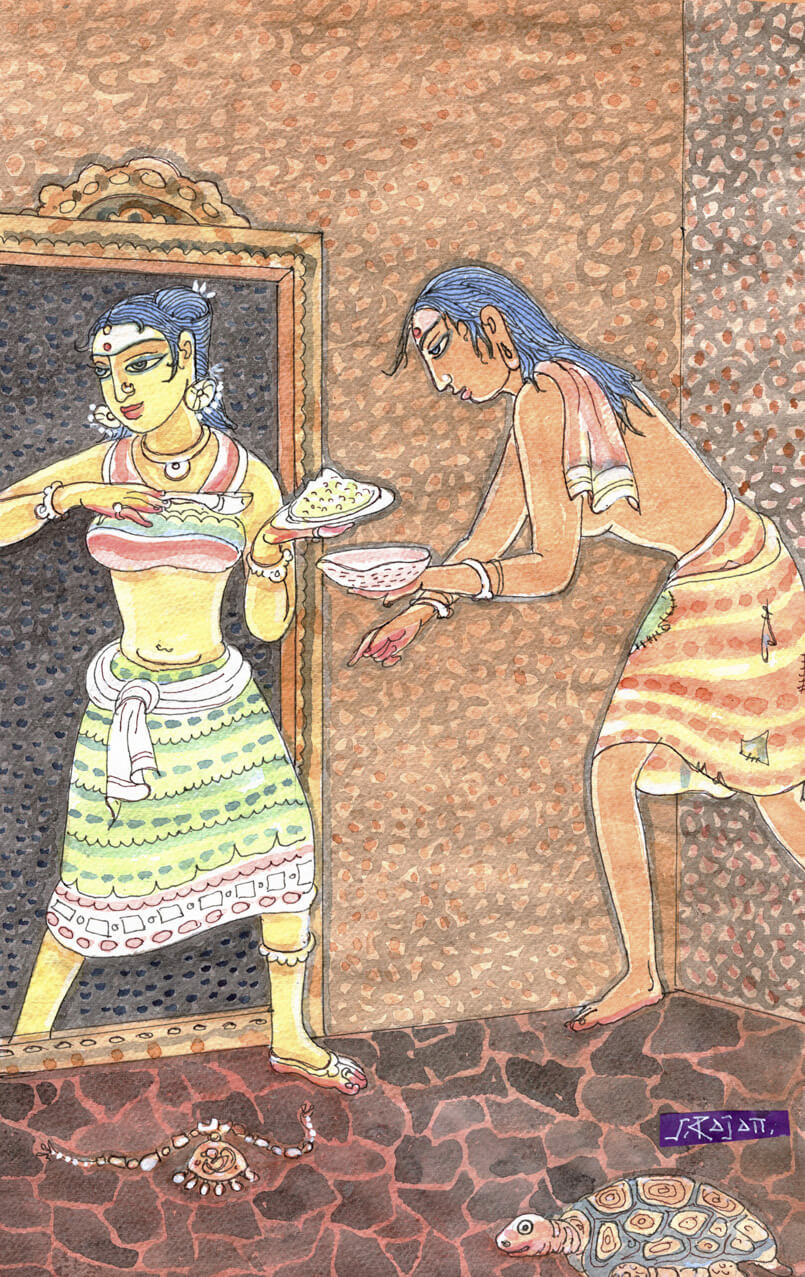
Chapter 18: Avoidance of Covetousness

A beggar has come to the door of a woman who brings him a savory bowl of food. Though impoverished, he points out a valuable necklace she has dropped, showing he does not wish another’s wealth to be his. A tortoise rests nearby, his limbs withdrawn into his shell, a metaphor for withdrawing the senses of desire.
You can access the entire text, in Tamil and English here:
Weaver’s Wisdom
Verse 171
In the very attempt to wrongly gain another’s wealth,
a man forfeits his family’s future and his own faultlessness.
Verse 172
Those who deem injustice shameful never commit
guilt-yielding deeds driven by money-yielding desires.
Verse 173
Those who seek immortal bliss will not succumb
to immoral deeds that follow desire for fleeting delights.
Verse 174
With senses conquered and sight unclouded by depravity,
one will not wish for others’ wealth, even in destitution.
Verse 175
What avails a man’s subtle and comprehensive learning,
if, crazed by covetousness, he treats others insensibly?
Verse 176
Desiring grace and doing his duty, a man who desires wealth
but acquires it wrongly is destroyed nevertheless.
Verse 177
Do not seek the fortune that greed gathers,
for its fruit is bitter on the day of enjoyment.
Verse 178
To protect one’s own prosperity from decline,
one must not crave the property held by others.
Verse 179
Just as wise men know the goodness of noncoveting,
so Fortune Herself knows their goodness and draws near.
Verse 180
There is a thoughtless desire for others’ things that is destructive.
There is a mindful pride that, in refusing to covet, is triumphant.
Tirukural – Chapter 17
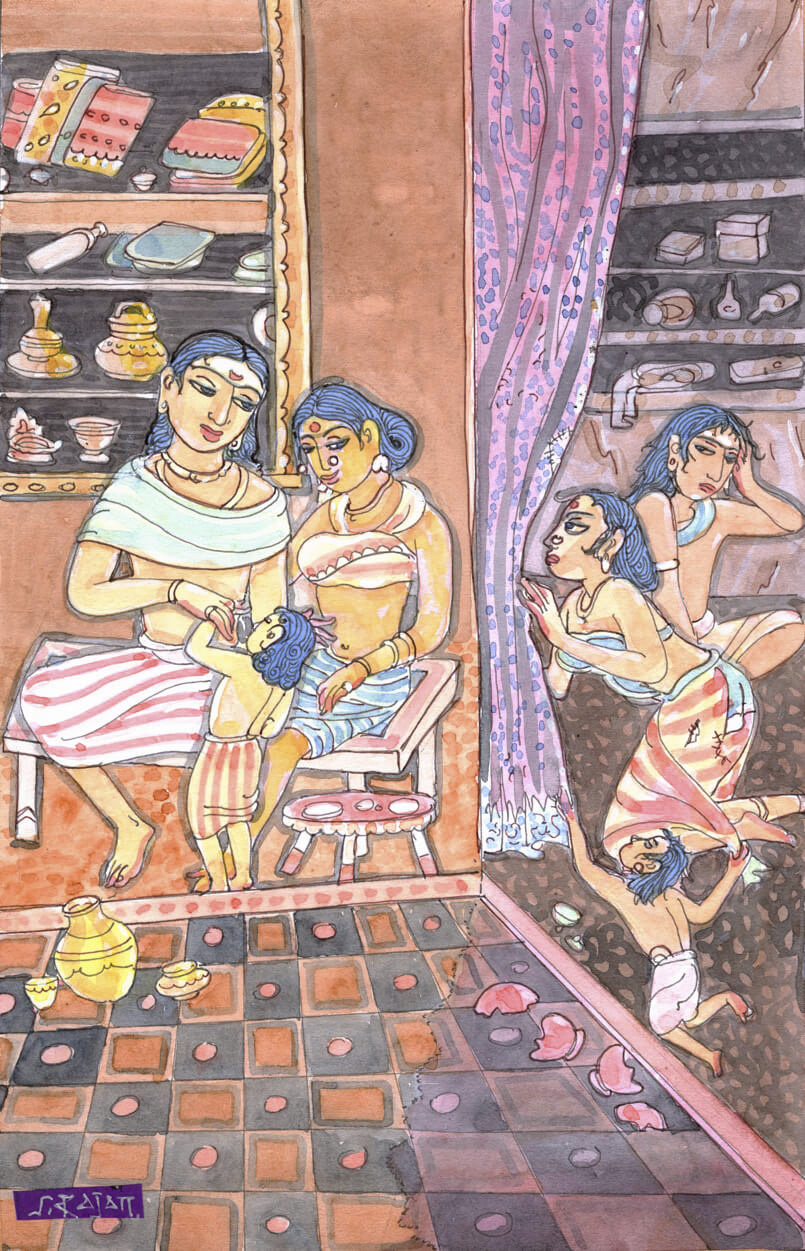
Chapter 17: Avoidance of Envy

Verse 166
There is a room filled with beautiful objects and in it a family finds contentment. In the adjoining apartment an impoverished woman is hiding behind the curtain, envious of her neighbors. Her husband has his hand on his head to indicate suffering and the children are pulling at her clothes.
You can access the entire text, in Tamil and English here:
Weaver’s Wisdom
Verse 161
The unenvious heart is to be valued
no less than virtuous conduct itself.
Verse 162
Among the many precious things a man may acquire,
none surpasses a nature free from envy toward all.
Verse 163
They say he who is jealous instead of joyous of another’s wealth
clearly desires no wealth or virtue of his own.
Verse 164
Envy will never cause one to commit wrongful deeds
who rightly fathoms the disgrace that follows.
Verse 165
A man’s own envy is foe enough to forge his ruin,
even if he has no other enemies.
Verse 166
Whoever begrudges another’s bounty will watch
his kindred die in poverty, naked and starving.
Verse 167
Goddess Fortune, intolerant of those who cannot tolerate others’
success, introduces them to her sister, Misfortune, and goes away.
Verse 168
The wicked one called Envy consumes this world’s wealth,
then consigns sinners to those worlds of hellish fire.
Verse 169
It is worth pondering why good men may be poor
while the envious in heart can prosper.
Verse 170
There are no envious men who have risen to prosperity.
There are no men free from envy who have fallen from it.
From Our Gurus' Teachings
Archives are now available through 2001. Light colored days have no posts. 1998-2001 coming later.

